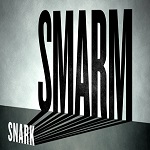 A lot of people have been talking about Tom Socca’s Gawker piece “On Smarm“, in which he argues than snark and sarcasm are a necessary response to “Smarm”, which he defines as dishonest nonsense serving the interests of power. He raises a few valid points, though his argument is as full of holes as a Swiss cheese, and you can see him lining up the straw men as if they’re dominoes.
A lot of people have been talking about Tom Socca’s Gawker piece “On Smarm“, in which he argues than snark and sarcasm are a necessary response to “Smarm”, which he defines as dishonest nonsense serving the interests of power. He raises a few valid points, though his argument is as full of holes as a Swiss cheese, and you can see him lining up the straw men as if they’re dominoes.
Allan Mott has written a strong riposte which sums up a lot of my thoughts.
But the crucial miscalculation in Scocca’s argument is that the only reason smarm is the antithesis to snark is because both are equally flawed as rhetorical devices. By reacting as it does against the forces he laments snark does as much damage as it prevents. It’s fighting toxic waste with toxic waste—a defence that only leads to more cultural pollution, not less.
No, the true weapon against both smarm and snark is sincerity. To clearly and honestly engage in a debate without invective or adornment and trust that those who you are arguing with are doing so based on their true principles and beliefs and not merely for attention, ego, profit or entertainment.
That’s precisely what I try to do as a music critic. Yes, I know well-written snark can be entertaining to read and sometimes cathartic to write; for example, Alexis Petridis’ one-star review of The Pigeon Detectives. But nothing beats sincerity and honesty, and as at least one artist has told me, the prog world in particular needs more honest reviews. When it comes to smarm and snark, there is far too much of both in the music world. There is no way, for example, that I’ll ever start writing reviews like this one.